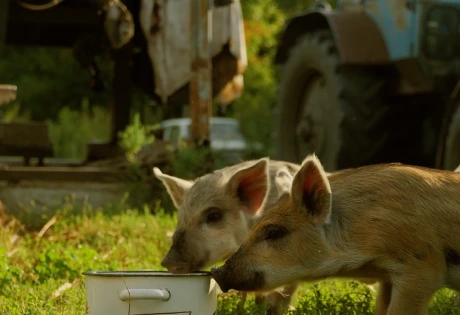Respect Creation
We believe that the moral, ethical and spiritual viewpoint that food producers hold has a direct impact on the quality of the food they produce. At Ashfount Investments, one of our core beliefs is to Respect Creation.
But what do we mean when we talk about Respecting Creation? How does this tie in with regenerative farming practices? And, what are the benefits of a food space framework that embraces this concept?
We Live in a Culture that does not Respect Creation
The issues we collectively face due to climate change and the increase of carbon emissions are well-known and well-publicized. However, for many people, the threat posed to our collective health and food security from our modern agricultural practices are less well-known. A quick glance at some statistics paints a sobering picture:
About a quarter of the Earth’s ice-free land area is subject to human-induced degradation…Soil erosion from agricultural fields is estimated to be currently 10 to 20 times (no-tillage) to more than 100 times (conventional tillage) higher than the soil formation rate.
(IPCC)
Factory Farms account for over 95% of total livestock farming in the U.S.
(ASPCA)
There are more than 50,000 facilities in the U.S. that are classified as CAFO’s (concentrated feeding operations).
(The Guardian)
Despite the increase in food abundance in the U.S. about half of all Americans (117 million) have one or more preventable chronic diseases, many of which are related to poor quality eating patterns and physical activity.
(CDC)
There has been a huge rise in the number of crops being produced in monocultures. 75% of the world’s crop varieties have been lost in the last 100 years.
(IUCN)
The way we have produced food over the last century has had a significant negative impact, not only on our health but on the health and wellbeing of the animals we farm and our agricultural future.But what has led to this change in our ethos around food production? Why are we destroying our landscapes and soil, and using animals as commodities rather than viewing them as sentient beings?
For many, the answer lies in the way we have embraced technological change while ignoring key facets of a respectful relationship with nature.
Respecting the life of all beings, big and small, that are found on our planet. Our sense of unity with the animals and plants around us have been separated for too long. In order to create meaningful change, we need to respect the creation that is all around us.
Understanding the Context – Examining our Relationship to Creation
Farmers, ecologists, scientists, and those of faith are waking up to the reality of the difficulty in effecting meaningful positive change in ourselves, ad our communities towards solving the problem of climate change and environmental degradation.
Many of these people have begun to examine their faith, especially in the Christian world. They are beginning to understand that the material and the spiritual cannot be separated and that caring for our environment and resources is intrinsic to faith and the relationship they have with God.
In this sense “Respecting Creation” is more than protecting our planet from the effects of pollution or climate change. It’s about a fundamental shift in our ethos, and questioning the attitudes we hold towards nature.
Even if you do not consider yourself to be religious, it is still worth hearing what leaders in the church have to say – and how those of faith on the ground are examining their beliefs and how it relates to the way they choose to produce and/or consume food.
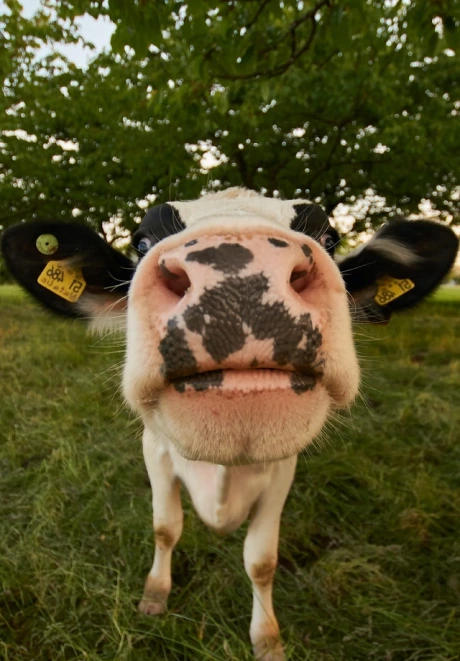
On Care for Our Common Home
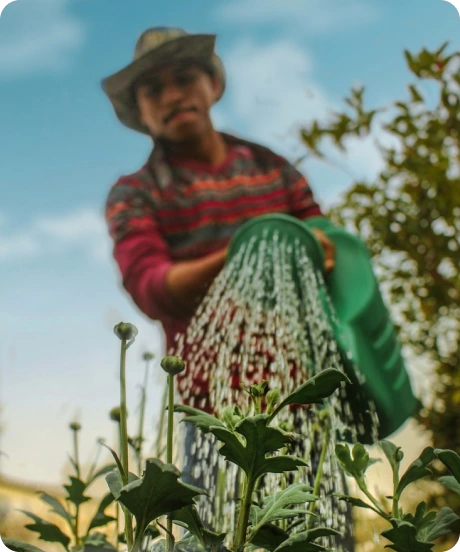
In June 2015, the encyclical letter Laudato Si’; “On Care for Our Common Home”, written by Pope Francis, was published.
In the encyclical, the Pope speaks about the challenges that we are collectively facing when it comes to climate change, environmental degradation, irresponsible development, and consumerism. He says:
“The continued acceleration of changes affecting humanity and the planet is coupled today with a more intensified pace of life and work which might be called “rapidification”. Although change is part of the working of complex systems, the speed with which human activity has developed contrasts with the naturally slow pace of biological evolution. Moreover, the goals of this rapid and constant change are not necessarily geared to the common good or to integral and sustainable human development.”
He goes on to say:
“Our insistence that each human being is an image of God should not make us overlook the fact that each creature has its own purpose. None is superfluous. The entire material universe speaks of God’s love, his boundless affection for us. Soil, water, mountains: everything is, as it were, a caress of God.
When we speak of the “environment”, what we really mean is a relationship existing between nature and the society which lives in it. Nature cannot be regarded as something separate from ourselves or as a mere setting in which we live.
Any technical solution which science claims to offer will be powerless to solve the serious problems of our world if humanity loses its compass, if we lose sight of the great motivations which make it possible for us to live in harmony, to make sacrifices and to treat others well.”

The words that the Pope speaks are powerful. But for some people, there is still a disconnect between the idea of faith and spirituality, and the choices that we make individually and collectively about how we treat nature – and especially how we treat our food production.
To put the Pope’s words into context from an agricultural point of view, let’s take a look at the work of Joel Salatin, of Polyface Farms; a committed Christian and a leading figure in the regenerative agricultural movement.
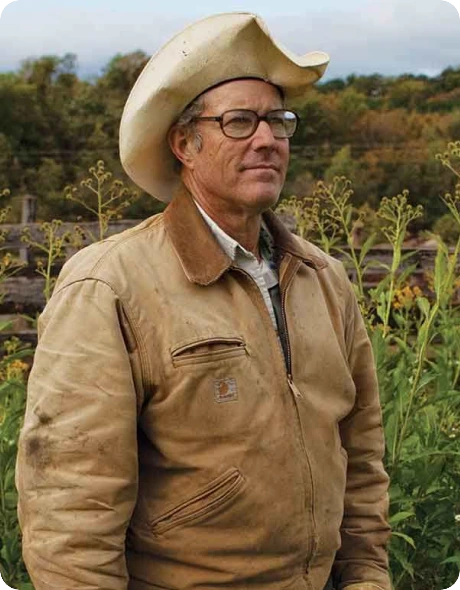
“Memorizing verses and the catechism is fine, but how does it translate into practical living? Does God care if we use Styrofoam or paper plates at the church potluck? Does God care if we stop for Happy Meals on our way to a sanctity of life rally?”( Joel Salatin)
Respecting the “Pigness of the pig”
In his book “The Marvelous Pigness of Pigs: Respecting and Caring for All God’s Creation”, Joel Salatin examines beliefs around modern industrial farming from his point of view as a Christian farmer who works in a holistic, regenerative way. Although his work speaks directly to fellow Christians and the faith community, his words are powerful for all people who have become disconnected from their food and how it is produced.
He believes that during the last few decades many Christians have lost their way when it comes to viewing our food resources through the lens of God’s creation. “One of the issues right now in our thinking is that Christians have allowed ourselves to be taken in with a mechanical view of life. That beings…are just piles of protoplasmic structure that can be manipulated however cleverly hubris can imagine to manipulate them. What happens is that demeans life down to a place as nothing more special than a piece of clay, a rock, a widget, an extruded copper fitting from a plumbing factory…ultimately if we’re going to preserve a sanctity of life we must preserve an honor and respect of the beingness of the being. And how we appreciate the pigness of the pig…. is the moral framework on which we honor and respect the Thomas of Tom, the Maryness of Mary.”
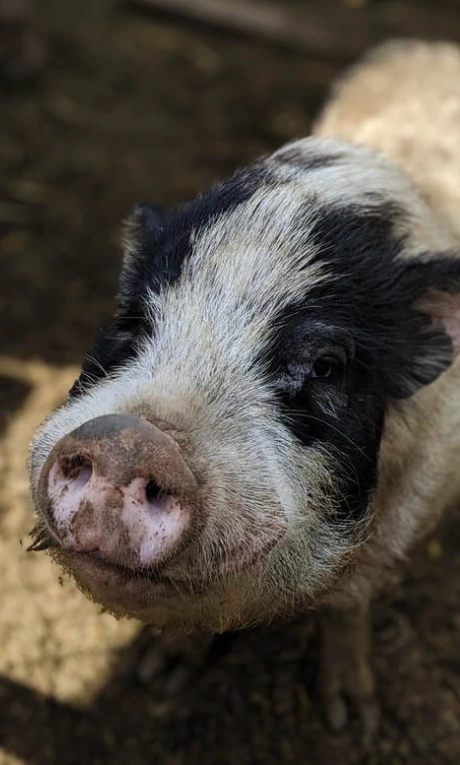
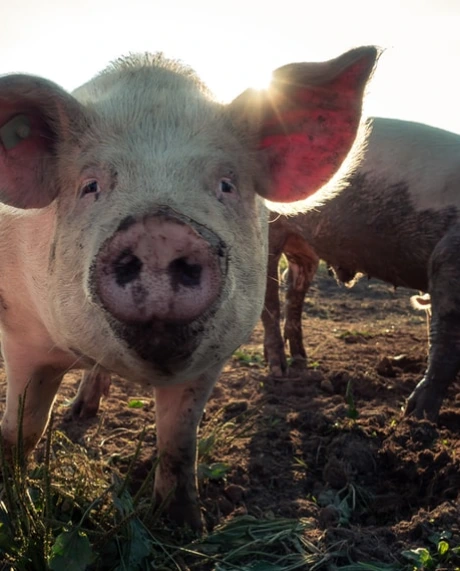
What does he mean when he talks about respecting the pigness of the pig? For Salatin, understanding animals and their natural behaviors are not just an exercise in developing more sustainable agricultural practices. He relates a Christian’s ability to respect and honor the natural behavior to their ability to respect, and ultimately glory, God.
“Glory speaks to uniqueness; what makes God God, you you and me me. And a pig a pig. With respect to glory, biblically speaking, God’s glory inherently is no more special than a forest, a pig or a civilization. Respecting the glory of each encourages a respect for the glory of all….If we can’t appreciate the pigness of the pig, we can’t appreciate the goodness of God.”
Salatin argues that “our research and farming practices are predicated on growing everything faster, fatter, bigger, cheaper, without regard to respecting and honoring distinctiveness.”
And his conclusion?
“I would suggest that a culture that views its pigs as just mechanical objects to be reprogrammed and manipulated will view its citizens the same way, and ultimately God the same way.”
For Salatin, the framing is religious, but his point should be easy to understand for people whatever their personal faith. Because if we continue to see our land and the animals we farm as purely commodities and continue with the type of unchecked consumerism that the Pope discusses in On Care for The Common Home, we run the risk of viewing each other as pure commodities.
This, coupled with the increasing effects of climate change, could lead to a severe rupturing of the social order and our communities.
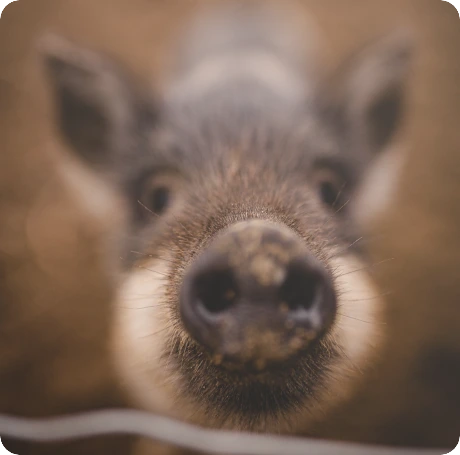
Respect for Creation and Healing Animal Suffering
Many farmers in the regenerative space have woken up to the fact that the way that we have justified producing meat on a large scale has led to unjustifiable suffering for large numbers of livestock.
When animals are treated as commodities, the standards that might normally be applied to their natural behavior are ignored in favor of intensifying production. Most factory-farmed animals are reared in overcrowded conditions. This prevents them from expressing behavior such as foraging or nesting – and the stress can often lead to them inflicting injuries on one another.
Mutilation of animals is also common, with many chickens having their beaks trimmed or pigs having their tails docked. This causes intense pain for the animal as well as preventing them from natural behaviors. Demand for fast-growing animals can lead to overly concentrated feed and selective breeding which places their bodies under intense physiological stress.
It’s distressing to consider the pain that many of these animals are experiencing. But even in operations where a pig, for example, does not have its tail docked, the prevention of natural behavior is still a big problem.
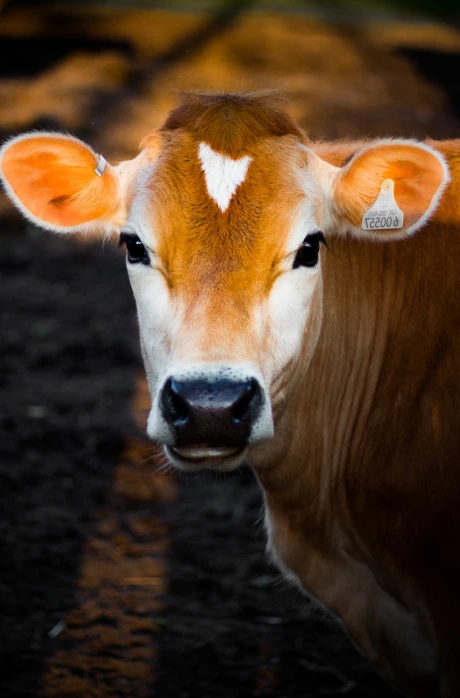
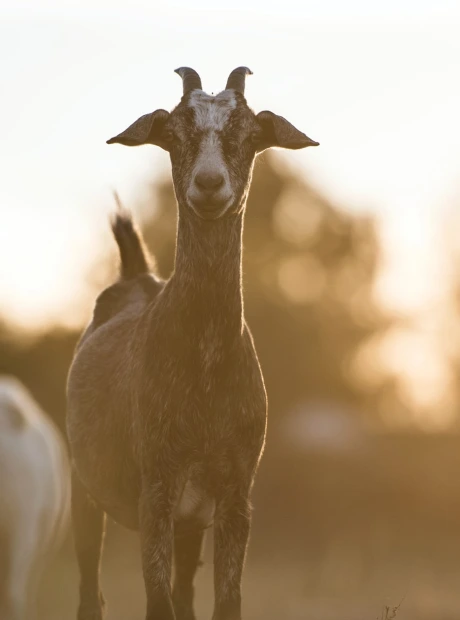
“[G]ood animal welfare used to mean you don’t intentionally inflict pain and discomfort on the animal. You keep them fed. You keep them safe. You don’t hurt them. All of us believed that was good animal welfare, and most people still believe that.
To us, now, that is no longer sufficient. For me and my family and my employees, good animal welfare means it is incumbent upon us as herdsmen to create an environment in which the animals can express instinctive behavior.
Cows were born to roam and graze. Chickens were born to scratch and peck. Hogs were born to root and wallow. Those are instinctive behaviors. If they’re deprived of that aptitude, that is poor animal welfare.
If you have a cow on a feedlot, a hog in a gestation crate, a chicken in a battery cage, they’re safe, they’re reasonably comfortable, but they can’t express instinctive behavior.”
“It’s like putting your child in a closet and saying, ‘This is great. I keep the temperature at 72 degrees. I leave the light on. He’ll never break his leg playing football. He’ll never be abducted. He’ll never be run over by a bus … That may seem like great child-rearing — except it’s not.”(Will Harris)
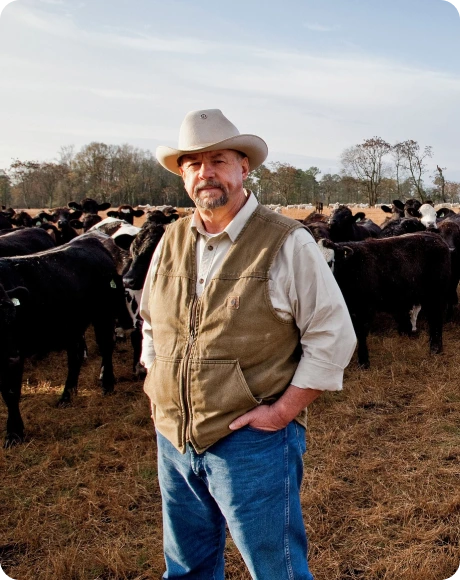
Changing Our Ethos – Scarcity vs. Abundance
Joel Salatin argues that industrial farming is based on a scarcity mindset. It’s a fragile system that has been made vulnerable by issues such as monoculture farming and Concentrated Feeding Operations. In these systems, disease is rife and soil degradation and a lack of biodiversity have led to the overuse of chemicals to force crop yields.
Salatin argues that our farming models should be based on resilience, with healthier soil and animals that are free to express their natural behaviors. Only then can we farm in a way that creates healing and abundance. To do this each animal farmed and each crop chosen ought to be considered for its nature and essence.
In the case of pigs, for example, farmers must consider what their natural behavior and abilities are. A pig can use its nose to plow and it has a special talent for moving things around. This talent can be harnessed and used for the benefit of the farming operation. In this way the uniqueness of the pig is honored, which in turn leads to greater respect – as well as a host of other benefits for farming practices.
On Salatin’s farm pigs are used to help build compost, alongside cows. In the winter, hay is fed to the cows who are bedded with woodchip and straw, By the summer the cows are removed from these areas and the pigs are allowed in. They rotovate the compost as they seek out fermented corn that the workers have placed within the bedding layer, converting the compost as they do from anaerobic material to aerobic.
As Salatin explains, this task is something that suits the “pigness of the pigs” – it is a job they are happy to do and that they enjoy, And, it is one that has a positive function on the farm. Rather than a commodity, the pig has now become a co-laborer in the farming project. As Salatin explains:
“Suddenly our spiritual resonance, respect, and appreciation for the glory of pigs completely change our relationship. They are no longer protein stuff, but primarily fellow workers, sharing a common vision and visceral participation in the needs of the farm.”
Respecting Creation Leads to Happy, Healthy, Viable Food Production
We’ve already taken a look at why respecting creation should matter from a moral and ethical point of view. But, as touched upon with Joel Salatin’s use of pigs to help build compost at Polyface Farms, respecting creation is not just a religious and moral viewpoint. It’s also a way of farming that can materially benefit the farmers, the local community and the wider globe.
“One of creation’s most basic patterns is that perennials build soil; annuals use accumulated fertility in a seasonal flush of production. That in modern times we think we can circumvent these patterns, take the herbivores off the land, plow up the perennials indefinitely, and substitute with chemicals is an insult to God’s pattern.” (Joel Salatin).
Restoring our soil and reducing our use of harmful chemicals is vital to future food security. Many farms who have switched to a holistic management framework have discovered that they are getting better and more varied yields from their efforts to increase biodiversity in the soil. The reduction of harmful chemicals can impact not only soil health and the health of workers but also save money.
For example, Salatin says he has not used chemical fertilizer since 1961. Instead, they run chickens after cows to provide parasite and grub control. They then make thousands of dollars of profit from the eggs as a by-product of this system. The use of pigs to make compost save money on heavy compost turning machines, as well as freeing the farm from needing a pesticide license, having to pay the associated fees and attending the classes on how to use the chemicals. Learn more about no tillage farming.
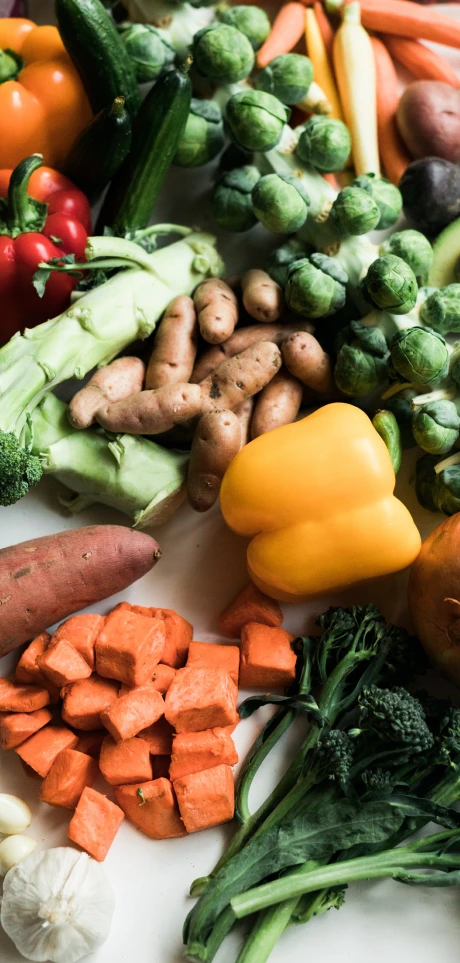

The way we eat in the U.S. is currently not doing us any favors when it comes to health. And, with the majority of meat consumed coming from intensively farmed animals it’s no wonder.
Intensively farmed animals often have lower levels of beneficial omega-3 and a less favorable ratio of omega-3 – omega-6. Crowded conditions on factory farms can also lead to an increase in bacteria such as E-coli and Salmonella.
Evidence shows that routine use of antibiotics in industrial farming is leading to the rise of AB resistant superbugs. Globally, there is a significant risk of humans entering a post-antibiotic age, with previously treatable diseases becoming deadly.
On the other hand, animals that are treated with respect and allowed to express their natural functions are usually far healthier and happier – leading to far less medical interventions. There’s evidence, too, that food that has been farmed in a way that corresponds to nature can often be demonstrably more nutritious.
For example, Joel Salatin analyzed the nutritional content of eggs and compared them to the USDA standard nutritional egg profile.
Some of his results were:
-
USDA: 0.97 mg
Polyface Farm: 7.37mgVitamin A
-
USDA: 487 IU
Polyface Farm: 763IU
-
USDA: 0.033 g
Polyface Farm: 0.71 g
-
USDA: 423mg
Polyface Farm: 292 mg
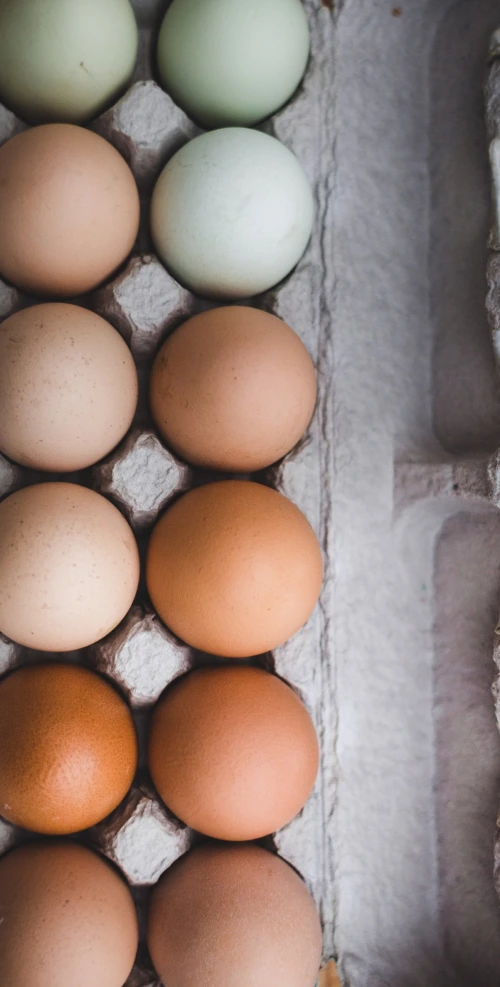
These are impressive results which underline the benefits of respecting creation. To deny the chicken the ability to run around on pasture is to deny the person who eats the egg a full nutritional package.
Respecting Creation – A Boon for Investors
Many farmers in the regenerative space point out that farming is not an attractive option for many younger farmers. Many young farmers are leaving their farms because they don’t want to be stuck with debt to agrochemical companies and using practices they are not ethically happy with.
Regenerative farming that respects creation gives them another option and allows them greater freedom over the business.
Advocates of regenerative farming believe its time has come in terms of future investments. Practices are gaining traction as their efficacy is more widely understood and promoted. People globally are waking up to the knowledge that we cannot continue to farm in the industrial model. In years to come, regenerative farming practices are likely to become ever more popular.
This is good news for anyone who wants to invest in businesses that can help their bottom line as well as being a savvy decision sustainably speaking.
At Ashfount Investments, we believe that the way forward for any venture in the food space is one that aligns with great respect for creation and a willingness to become a steward of the land and animals under our care. When we respect creation we can build businesses that truly flourish, spiritually, ethically, and financially.

